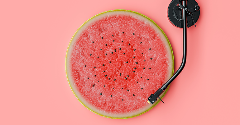News
Spending on U.S. advertising for sugary drinks increases 26% to over $1 billion
9 Jul 2020Beverage companies increased their spending on advertising sugary drinks by 26% to over $1 billion between 2013 and 2018, according to a new study from UConn Rudd Center for Food Policy & Obesity. This increase in advertising primarily targets communities of color where preschoolers, children and teens are the primary recipients of this messaging.
This increase in advertising dollars was particularly pronounced for television advertising although the rate of viewership decreased during the same period. Exposure to TV ads declined 35% for preschooler (2-5 years), 42% for children between 6 and 11 years, and 52% for teenagers (12-17 years). In spite of the smaller amount of time spent watching the tube, companies still pushed significant marketing dollars through this channel.

Spanish-language TV advertising rose 8% from 2013. The increase was even more stark from 2010 with an 80% jump in advertising dollars for soda, sports drinks and energy drinks on these stations within the past 10 years. PepsiCo, Coca-Cola, Dr Pepper Snapple Group, and Innovation Ventures were responsible for 98% of sugary drink and energy drink ad spending through this media.
For Black children, the statistics were also higher than their white counterparts. The report identified Black children as 2.1 times more likely to see sugary drink ads and Black teens 2.3 times more likely to be exposed to these ads.
While the majority of the advertising for sugary beverages is invested in soda brands, sports drinks also saw a significant bump with spending increasing 24% during the time period and advertising for sweetened ice tea rising 66%.
The energy drink category saw a 34% decline in spending and fruit drinks and flavored water categories experienced a 5% reduction in advertising spending.
The report noted, “Despite major beverage companies’ pledges to increase marketing of lower-calorie drinks, sugary drinks continue to represent the vast majority of brands’ advertising expenditures.”
Based on the findings in this study, researchers recommend that beverage manufacturers, retailers, and media companies reduce the marketing of these beverages to support public health. Regular consumption of sugary beverages has been shown to increase the rates of heart disease, type 2 diabestes and even result in death.
"It's well past time for the industry to stop putting profits ahead of our kids' health and put their advertising dollars behind products that contribute to good health rather than undermine it," said researcher Fran Fleming-Milici, in a statement.
Related news

Retail landscape lacks nutritious and affordable food, says ATNi
30 Dec 2025
A rapid increase in modern food retail has given retailers growing influence over consumer diets, according to global non-profit ATNi’s latest assessment.
Read more
Debate over ban on ‘meaty’ names for plant-based products reaches stalemate
26 Dec 2025
The debate over a ban on plant-based products using “meaty” terms has reached a stalemate, leaving manufacturers in limbo and still facing overhauls to their marketing and packaging.
Read more
Multi-sensory food and drink products to gain traction in 2026
16 Dec 2025
Trend forecasters predict that sensory elements will play a larger role, helping food and beverage brands differentiate themselves in a competitive market in 2026.
Read more
Big appetite for M&A between European and US food and drink companies
3 Dec 2025
Persistent tariffs on EU food and beverage exports have helped drive record levels of M&A activity between European and US companies this year, according to analysis by ING.
Read more
Non-UPF Program extends certification scheme to entire food industry
30 Nov 2025
The Non-UPF Program has extended its certification scheme to the wider food sector, championing a move towards healthier consumption habits.
Read more
Lancet study links UPFs to chronic disease risk
26 Nov 2025
UPFs are consistently associated with an increased risk of diet-related chronic diseases, according to a comprehensive review of global evidence in The Lancet .
Read more
Concerns swirl around cinnamon’s compliance with EU law
25 Nov 2025
Cinnamon may be a top functional ingredient, but it needs stronger protocols to ensure it meets EU food safety laws and quality standards, say researchers.
Read more
Oat Barista: Innovation for game-changing beverages
20 Nov 2025
Oat Barista is a clean label, sustainable, and innovative drink base specifically designed to create the perfect foam in one single ingredient.
Read more
How younger consumers are redefining ingredient choices and rejecting brand loyalty
18 Nov 2025
Gen Z and millennial consumers’ preferences for transparency, functionality, and purpose are “redefining the very nature of consumption itself”, says SPINS.
Read more
Hybrid formats and flexible positioning to disrupt category norms in 2026
17 Nov 2025
Trend forecasters expect food and drink to move more fluidly across occasions, functions, and formats as consumers seek versatility, novelty, and convenience.
Read more